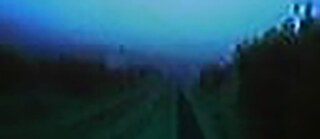Redemption From the Hamster Wheel
On the Abyss
Is this supposed to be the promised place? Are they waiting for the fallen angel of history who, from atop a mountain of trash, will comfort them with the resigned words, “Fear ye not!”? Who on earth was going to believe that, seeing as even a pandemic had proven incapable of stopping the eternal return of the same, the endless circles trudged in our mental prison yards, all that running on the spot?
A chill is still in the air. Two drunk, sleep-drugged figures in a car are weaving their way through the empty streets of the still drowsy, exhausted town of Guadalajara towards suburban dawn. In their baggage: milk jugs, 90 proof alcohol, amaretto, espresso.
For all their tiredness, a seasoned, taciturn pleasure of anticipation gradually takes hold of the car’s occupants the further their vehicle proceeds in a north-northeasterly direction. The first streaks of light signal their destination to which the traveling friends — by now augmented to three — with their precious offerings onboard are headed with messianic expectation. This time too they are looking forward to redemption, as they have always done on their eternal return: redemption from samsara, from the hamster wheel of everyday life, from perpetuum mobile, which even anti-systemic institutionalized German teachers are not able — or willing? — to evade. Maybe they are staring as if mesmerized at the hub of the wheel, which appears to be barely moving. Shouldn’t they be advancing towards the center, to the hub, in order to experience relief? But relief is not redemption: It’s like defining standstill as immeasurably slow movement. Fact is, they have still not found an emergency brake to stop the hamster wheel — or not yet dared to pull it.
And so, on their way to the promised place, at the fork in the road, they take the palliative turn to the left. Off to the right, by contrast, is a frenzy of activity. A busy swarm of people in more or less pricey sportswear is moving towards the abyss: women seeking to shed further pounds from their bodies; aging men seeking to revive their midlife crisis-scarred bodies with a youthful, perspiring sheen; actual young people who truly relish sporting activity. Following a busy week, they are all jogging down the trail into the canyon, from where — at the latest by the time they have reached the stinking cesspool called Santiago River — they will run back up again. An act of heroism now only glorified in the figure of Sisyphus.
Is this supposed to be the promised place? Are they waiting for the fallen angel of history who, from atop one of the mountains of trash, will comfort them with the resigned words, “Fear ye not!”? Who on earth was going to believe that, seeing as even a pandemic had proven incapable of stopping the eternal return of the same, the endless circles trudged in our mental prison yards, all that running on the spot? The three travelers are thus not expecting an angel when they park their car beneath one of the heaps of refuse. Instead, they catch sight of cows ambling through the mud between piles of debris and their own cow pies, if they aren’t just standing still, competing with the trash mountains for who is the most stationary.
The longer they feast on their rustic energy drink, the more their wearied spirits brighten up, the more their thoughts become unleashed, freely associative, and convivial, prompting much mirth and rapture. Having imbibed two liters of milk laced with shots, they gradually calm down and experience the tranquil, inebriated moment, where they would gladly abide a while because it is so delightful. Just for the heck of it.
For all their tiredness, a seasoned, taciturn pleasure of anticipation gradually takes hold of the car’s occupants the further their vehicle proceeds in a north-northeasterly direction. The first streaks of light signal their destination to which the traveling friends — by now augmented to three — with their precious offerings onboard are headed with messianic expectation. This time too they are looking forward to redemption, as they have always done on their eternal return: redemption from samsara, from the hamster wheel of everyday life, from perpetuum mobile, which even anti-systemic institutionalized German teachers are not able — or willing? — to evade. Maybe they are staring as if mesmerized at the hub of the wheel, which appears to be barely moving. Shouldn’t they be advancing towards the center, to the hub, in order to experience relief? But relief is not redemption: It’s like defining standstill as immeasurably slow movement. Fact is, they have still not found an emergency brake to stop the hamster wheel — or not yet dared to pull it.
And so, on their way to the promised place, at the fork in the road, they take the palliative turn to the left. Off to the right, by contrast, is a frenzy of activity. A busy swarm of people in more or less pricey sportswear is moving towards the abyss: women seeking to shed further pounds from their bodies; aging men seeking to revive their midlife crisis-scarred bodies with a youthful, perspiring sheen; actual young people who truly relish sporting activity. Following a busy week, they are all jogging down the trail into the canyon, from where — at the latest by the time they have reached the stinking cesspool called Santiago River — they will run back up again. An act of heroism now only glorified in the figure of Sisyphus.
Is This Supposed to Be the Promised Place?
Our three wise German teachers have no interest in such heroism. They are striving for redemption, for a place of repose, a place to abide a while, an atemporal oasis on the edge of the wasteland of progress towards nowhere. On taking the left-hand fork in the road, they too head towards the abyss before which mountains of trash and debris rise up into the sky. Discarded junk, suitcases, posters, toys, dolls, chairs, armchairs, rags, scrap metal, broken power pylons, construction rubble. In brief, everything a developing civilization discharges at its peripheries that trims the margin dividing the city from the abyss. Beyond the mountains of trash, a cloud blanket nestles peacefully over the canyon.Is this supposed to be the promised place? Are they waiting for the fallen angel of history who, from atop one of the mountains of trash, will comfort them with the resigned words, “Fear ye not!”? Who on earth was going to believe that, seeing as even a pandemic had proven incapable of stopping the eternal return of the same, the endless circles trudged in our mental prison yards, all that running on the spot? The three travelers are thus not expecting an angel when they park their car beneath one of the heaps of refuse. Instead, they catch sight of cows ambling through the mud between piles of debris and their own cow pies, if they aren’t just standing still, competing with the trash mountains for who is the most stationary.
A Place like Momo’s Amphitheater
Against this backdrop, the three flâneurs stroll (andante ma non troppo) towards the cowshed at the end of the universe, a wooden shack clad in sheets of corrugated iron. In this place pervaded by an intimate symbiosis of man, fly, and cow, they arrive with their clay milk pitchers, hold them beneath an udder, and let a dairy farmer squirt milk into them with practiced gestures. It would not be complete without alcohol, Amaretto, or chocolate powder and expresso. The three then leave the grimy, rubbish-strewn cowshed. They didn’t encounter a swaddled infant or any other messianic evidence, but nonetheless found a liter of raw milk. They imbibe their nutritious breakfast, at first in silence, between flea-ridden cats and dogs. They contemplate the sea of fog covering the canyon, the morning sun as it lights up the buildings of the expanding village. They savor the place which up till now, so it seems, has been overlooked by growth and progress. A place like Momo’s amphitheater, a bubble, a glimpse of utopia, an appendix of civilization — constantly in danger of being incinerated by the gathering trash.The longer they feast on their rustic energy drink, the more their wearied spirits brighten up, the more their thoughts become unleashed, freely associative, and convivial, prompting much mirth and rapture. Having imbibed two liters of milk laced with shots, they gradually calm down and experience the tranquil, inebriated moment, where they would gladly abide a while because it is so delightful. Just for the heck of it.






